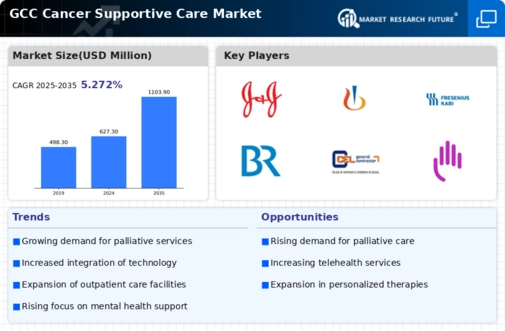Rising Cancer Incidence
The increasing incidence of cancer in the GCC region is a primary driver for the cancer supportive-care market. According to recent statistics, cancer cases in the GCC have shown a steady rise, with projections indicating a growth rate of approximately 2.5% annually. This trend necessitates enhanced supportive care services to manage symptoms and improve the quality of life for patients. As healthcare systems adapt to this growing demand, investments in supportive care facilities and services are likely to increase. The cancer supportive-care market is expected to expand as healthcare providers focus on comprehensive care strategies that address both physical and emotional needs of patients. This shift towards patient-centered care is crucial in a region where cancer prevalence is becoming a significant public health concern.
Increased Awareness and Education
There is a growing awareness of the importance of supportive care among patients, families, and healthcare professionals in the GCC. Educational initiatives aimed at informing stakeholders about the benefits of supportive care are gaining traction. This heightened awareness is likely to lead to increased demand for supportive services, as patients seek comprehensive care that addresses their physical, emotional, and psychological needs. The cancer supportive-care market is expected to benefit from this trend, as healthcare providers enhance their offerings to meet the evolving expectations of patients. Additionally, public health campaigns focusing on cancer prevention and management are likely to further drive interest in supportive care services, creating a more informed patient population that actively seeks out these essential services.
Government Initiatives and Funding
Government initiatives aimed at improving cancer care in the GCC are playing a crucial role in shaping the cancer supportive-care market. Increased funding for cancer research and supportive services is being allocated to enhance patient care. For instance, several GCC countries have launched national cancer control programs that emphasize the importance of supportive care in treatment pathways. These initiatives are likely to lead to the establishment of more comprehensive supportive care services, thereby expanding the market. Furthermore, collaboration between government entities and private healthcare providers is expected to foster innovation and improve access to supportive care. As a result, the cancer supportive-care market is poised for growth, driven by these strategic investments and policy frameworks.
Advancements in Treatment Modalities
Innovations in cancer treatment modalities are significantly influencing the cancer supportive-care market. As new therapies, including immunotherapy and targeted therapies, emerge, the complexity of patient care increases. These advanced treatments often come with challenging side effects, necessitating robust supportive care to mitigate adverse reactions and enhance patient comfort. The market is witnessing a surge in demand for specialized supportive services, such as pain management and nutritional support, tailored to the needs of patients undergoing these advanced therapies. Furthermore, the integration of supportive care into treatment protocols is becoming more prevalent, indicating a shift towards holistic patient management. This evolution in treatment approaches is likely to drive growth in the cancer supportive-care market as healthcare providers seek to optimize patient outcomes.
Technological Integration in Care Delivery
The integration of technology into healthcare delivery is transforming the cancer supportive-care market. Innovations such as telemedicine, mobile health applications, and electronic health records are enhancing the accessibility and efficiency of supportive care services. These technologies facilitate better communication between patients and healthcare providers, allowing for timely interventions and personalized care plans. As the GCC region embraces digital health solutions, the demand for technologically enabled supportive care is likely to increase. This trend not only improves patient engagement but also streamlines care coordination, ultimately leading to better health outcomes. The cancer supportive-care market is expected to expand as healthcare systems leverage technology to enhance service delivery and patient satisfaction.
















